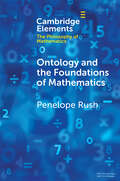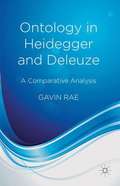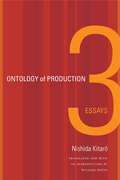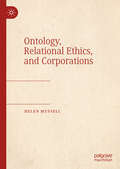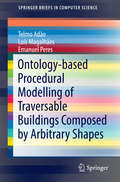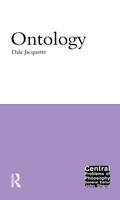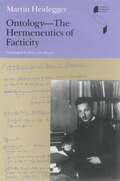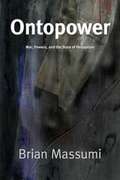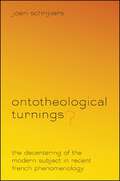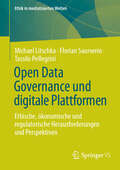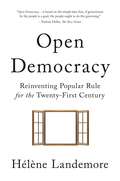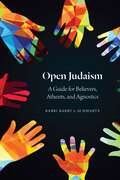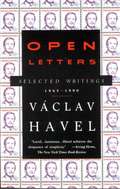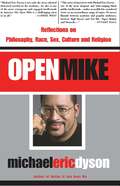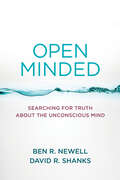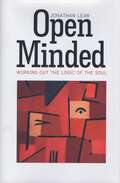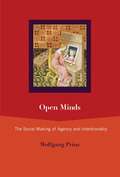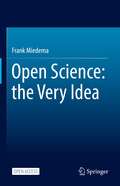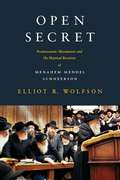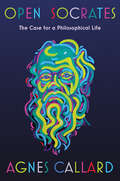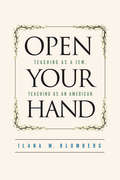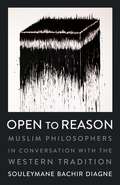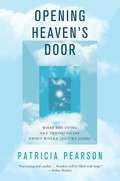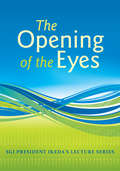- Table View
- List View
Ontology and the Foundations of Mathematics: Talking Past Each Other (Elements in the Philosophy of Mathematics)
by Penelope RushThis Element looks at the problem of inter-translation between mathematical realism and anti-realism and argues that so far as realism is inter-translatable with anti-realism, there is a burden on the realist to show how her posited reality differs from that of the anti-realist. It also argues that an effective defence of just such a difference needs a commitment to the independence of mathematical reality, which in turn involves a commitment to the ontological access problem – the problem of how knowable mathematical truths are identifiable with a reality independent of us as knowers. Specifically, if the only access problem acknowledged is the epistemological problem – i.e. the problem of how we come to know mathematical truths – then nothing is gained by the realist notion of an independent reality and in effect, nothing distinguishes realism from anti-realism in mathematics.
Ontology in Heidegger and Deleuze
by Gavin RaeThe first book in English to offer an extended comparative analysis of Heidegger and Deleuze. Those familiar with Heidegger's and Deleuze's thinking will find a detailed, well-researched book that comes to an innovative conclusion, while those new to both will find a clear, well-written exposition of their key concepts.
Ontology of Production: Three Essays
by Harry Harootunian William Haver Kitarō Nishida KitaroOntology of Production presents three essays by the influential Japanese philosopher Nishida Kitarō (1870-1945), translated for the first time into English by William Haver. While previous translations of his writings have framed Nishida within Asian or Oriental philosophical traditions, Haver's introduction and approach to the texts rightly situate the work within Nishida's own commitment to Western philosophy. In particular, Haver focuses on Nishida's sustained and rigorous engagement with Marx's conception of production.Agreeing with Marx that ontology is production and production is ontology, Nishida in these three essays--"Expressive Activity" (1925), "The Standpoint of Active Intuition" (1935), and "Human Being" (1938)--addresses sense and reason, language and thought, intuition and appropriation, ultimately arguing that in this concept of production, ideality and materiality are neither mutually exclusive nor oppositional but, rather, coimmanent. Nishida's forceful articulation of the radical nature of Marx's theory of production is, Haver contends, particularly timely in today's speculation-driven global economy. Nishida's reading of Marx, which points to the inseparability of immaterial intellectual labor and material manual labor, provokes a reconsideration of Marxism's utility for making sense of--and resisting--the logic of contemporary capitalism.
Ontology, Relational Ethics, and Corporations
by Helen MussellThis book offers a unique exploration and analysis of social responsibility and associated ethical concepts used by business and financial organizations. Mussell lays out the argument that a realist analysis of social responsibility reveals caring relations underpinning this ethical behavior. The combination of a realist social ontology with contemporary relational care ethics provides the theoretical framework needed to successfully explore the ethics of social responsibility. She then applies this realist caring relations argument to three specific contexts in which social responsibility is explicitly evident - including corporate social responsibility, socially responsible investment, and the legal concept of the fiduciary. By tracing the historical development of each concept – including how economic methodology has influenced interpretations and practice – a complex picture emerges, showing how ethics, economic theory, and political theory intersect. This is an insightful work of philosophically informed contemporary political economy, analyzing the evolution and connection of key ethical concepts widely used by organizations.
Ontology-based Procedural Modelling of Traversable Buildings Composed by Arbitrary Shapes
by Telmo Adão Luís Magalhães Emanuel PeresThis book presents a new procedural modelling methodology capable of producing traversable buildings constrained by arbitrary convex shapes, based on a pure treemap approach. The authors establish a process to change the format of interior rooms, through wall number modification and offer an adaptation of a "fake-concave" technique to support non-convex building layouts. It will also include: * A proposal for an extensible building ontology to guide the methodology process and support the generation of other architectural style buildings (e. g. roman houses); * A presentation of an ontology-based grammar to provide the procedural modelling methodology with production rules; * Experimental computer managed processes for the stochastic generation of buildings. Most of the existing solutions regarding building interiors only focus on the generation of floor plans mainly composed of rectangular shapes. Yet there are a wide variety of ancient and contemporary buildings that are composed of shapes other than rectangles, both internally and externally. Ontology-based Traversable Buildings Composed by Arbitrary Shapes will address this by providing the Procedural Modelling field with processes and techniques capable of properly supporting for example, digital preservation of cultural heritage or extensive virtual urban environment productions, specifically ones involving the generation/reconstruction of virtual buildings with such geometric requirements.
Ontology: Ontology (Central Problems Of Philosophy Ser. #7)
by Dale JacquetteThe philosophical study of what exists and what it means for something to exist is one of the core concerns of metaphysics. This introduction to ontology provides readers with a comprehensive account of the central ideas of the subject of being. This book is divided into two parts. The first part explores questions of pure philosophical ontology: what is meant by the concept of being, why there exists something rather than nothing, and why there is only one logically contingent actual world. Dale Jacquette shows how logic provides the only possible answers to these fundamental problems. The second part of the book examines issues of applied scientific ontology. Jacquette offers a critical survey of some of the most influential traditional ontologies, such as the distinction between appearance and reality, and the categories of substance and transcendence. The ontology of physical entities - space, time, matter and causation - is examined as well as the ontology of abstract entities such as sets, numbers, properties, relations and propositions. The special problems posed by the subjectivity of mind and of postulating a god are also explored in detail. The final chapter examines the ontology of culture, language and art.
Ontology—The Hermeneutics of Facticity (Studies in Continental Thought)
by Martin HeideggerThis probing analysis of the history of ontology is “of enormous significance for students of the development of Heidegger’s early thought” (Daniel O. Dahlstrom Boston University).First published in 1988, Ontology—The Hermeneutics of Facticity is the text of Heidegger’s lecture course at the University of Freiburg during the summer of 1923. In these lectures, Heidegger reviews and makes critical appropriations of the hermeneutic tradition from Plato, Aristotle, and Augustine to Schleiermacher and Dilthey. Through this critical survey, he reformulates the question of being on the basis of facticity and the everyday world.Specific themes deal with the history of ontology, the development of phenomenology and its relation to Hegelian dialectic, traditional theological and philosophical concepts of man, the present situation of philosophy, and the influences of Aristotle, Luther, Kierkegaard, and Husserl on Heidegger’s thinking. Students of Heidegger will find initial breakthroughs in his unique elaboration of the meaning of human experience and the “question of being,” which received mature expression in Being and Time.
Ontopower: War, Powers, and the State of Perception
by Brian MassumiColor coded terror alerts, invasion, drone war, rampant surveillance: all manifestations of the type of new power Brian Massumi theorizes in Ontopower. Through an in-depth examination of the War on Terror and the culture of crisis, Massumi identifies the emergence of preemption, which he characterizes as the operative logic of our time. Security threats, regardless of the existence of credible intelligence, are now felt into reality. Whereas nations once waited for a clear and present danger to emerge before using force, a threat's felt reality now demands launching a preemptive strike. Power refocuses on what may emerge, as that potential presents itself to feeling. This affective logic of potential washes back from the war front to become the dominant mode of power on the home front as well. This is ontopower--the mode of power embodying the logic of preemption across the full spectrum of force, from the "hard" (military intervention) to the "soft" (surveillance). With Ontopower, Massumi provides an original theory of power that explains not only current practices of war but the culture of insecurity permeating our contemporary neoliberal condition.
Ontotheological Turnings?: The Decentering of the Modern Subject in Recent French Phenomenology (SUNY series in Theology and Continental Thought)
by Joeri SchrijversThis incisive work examines questions of ontotheology and their relation to the so-called "theological turn" of recent French phenomenology. Joeri Schrijvers explores and critiques the decentering of the subject attempted by Jean-Luc Marion, Jean-Yves Lacoste, and Emmanuel Levinas, three philosophers who, inspired by their readings of Heidegger, attempt to overturn the active and autonomous subject. In his consideration of each thinker, Schrijvers shows that a simple reversal of the subject-object distinction has been achieved, but no true decentering of the subject. For Lacoste, the subject becomes God's intention; for Marion, the subject becomes the object and objective of givenness; and for Levinas, the subject is without secrets, like an object, before a greater Other. Critiquing the axioms and assumptions of contemporary philosophy, Schrijvers argues that there is no overcoming ontotheology. He ultimately proposes a more phenomenological and existential approach, a presencing of the invisible, to address the concerns of ontotheology.
Open Data Governance und digitale Plattformen: Ethische, ökonomische und regulatorische Herausforderungen und Perspektiven (Ethik in mediatisierten Welten)
by Tassilo Pellegrini Michael Litschka Florian SaurweinDieses Buch behandelt ethische, ökonomische und regulatorische Aspekte der Open Data Governance bei digitalen Plattformen. Wie Unternehmen der digitalen Ökonomie mit offenen Daten umgehen, wirft viele gesellschaftlich relevante Fragen auf: Wie können offene Daten und der darauf beruhende Content möglichst weit in der Bevölkerung verbreitet werden? Wie kann Content Moderation transparent organisiert und wie können Dateninfrastrukturen sozial erwünscht gestaltet werden? Das Buch analysiert die Fallstudien offene digitale Public-Value Plattformen, offene digitale Dateninfrastrukturen und Content Moderation und Kuratierung auf digitalen Plattformen und entwickelt Governance-Modelle, die eine Beurteilung verschiedener Regulierungsmöglichkeiten für Unternehmen der digitalen Plattformökonomie ermöglichen.
Open Democracy: Reinventing Popular Rule for the Twenty-First Century
by Hélène Landemore"Open Democracy envisions what true government by mass leadership could look like."—Nathan Heller, New YorkerHow a new model of democracy that opens up power to ordinary citizens could strengthen inclusiveness, responsiveness, and accountability in modern societies To the ancient Greeks, democracy meant gathering in public and debating laws set by a randomly selected assembly of several hundred citizens. To the Icelandic Vikings, democracy meant meeting every summer in a field to discuss issues until consensus was reached. Our contemporary representative democracies are very different. Modern parliaments are gated and guarded, and it seems as if only certain people—with the right suit, accent, wealth, and connections—are welcome. Diagnosing what is wrong with representative government and aiming to recover some of the lost openness of ancient democracies, Open Democracy presents a new paradigm of democracy in which power is genuinely accessible to ordinary citizens.Hélène Landemore favors the ideal of “representing and being represented in turn” over direct-democracy approaches. Supporting a fresh nonelectoral understanding of democratic representation, Landemore recommends centering political institutions around the “open mini-public”—a large, jury-like body of randomly selected citizens gathered to define laws and policies for the polity, in connection with the larger public. She also defends five institutional principles as the foundations of an open democracy: participatory rights, deliberation, the majoritarian principle, democratic representation, and transparency.Open Democracy demonstrates that placing ordinary citizens, rather than elites, at the heart of democratic power is not only the true meaning of a government of, by, and for the people, but also feasible and, today more than ever, urgently needed.
Open Judaism: A Guide for Believers, Atheists, and Agnostics
by Rabbi Barry L. SchwartzOpen Judaism offers a big-tent welcome to all Jews and Judaism. It is at once an invitation to the spiritually seeking Jew, a clarion call for a deeply pluralistic and inclusive Judaism, and a dynamic exploration of the remarkable array of thought within Judaism today. In honest, engaging language Barry L. Schwartz, a practicing rabbi and writer, presents traditional, secular-humanistic, and liberal Jewish views on nine major topics—God, soul, Torah, halakhah, Jewish identity, inclusion, Israel, ethics, and prayer. Teachings from many of Judaism&’s greatest thinkers organically reveal and embellish foundational ideas of Orthodox, Reform, Conservative, Reconstructionist, Renewal, and Humanistic Judaism. The conclusion sets forth core statements of belief in Judaism for believers, atheists, and agnostics, thereby summarizing the full spectrum of thought and enabling readers to make and act on their own choices.
Open Mike: Reflections on Philosophy, Race, Sex, Culture and Religion
by Michael Eric DysonHere, collected for the first time, are interviews and essays representing Michael Eric Dyson's most important thinking on race and identity. Exploring such topics as "whiteness" as seen through a black man's eye, modernism and postmodernism in black culture, and the emancipating role of black music from the plantation to the ghetto, Open Mike is a perfect introduction to Dyson's work and a must-have for students and scholars in African American Studies and Cultural Studies.
Open Minded: Searching for Truth about the Unconscious Mind
by Ben R. Newell David R. ShanksA provocative look at the unconscious mind that challenges contemporary perceptions and exposes the indefensible science that fostered them.How much of a role does the unconscious play in our decision making? In Open Minded: Searching for Truth about the Unconscious Mind, authors Ben R. Newell and David R. Shanks would argue: not very much. Behavioral science and public discourse have placed an outsized emphasis on the unconscious mind when it comes to understanding human behavior. Pursuing trails of fraud, intrigue, and claims about the power of unconscious thought, Newell and Shanks scrutinize the science that has contributed to our conventional wisdom and offer an important counterpoint to the ever-stronger traction that the unconscious mind has gained in public debate, such as the now ubiquitous claim that unconscious bias plays a large role in people&’s decisions and behavior.Open Minded is divided into two sections: the first examines the modern understanding of the conscious mind, and the second shifts the focus to how to reform current research. Focusing on the core processes of decision making, Newell and Shanks cut through many questionable claims about unconscious behavior. Then, they delve into the nuts-and-bolts of methodology, challenging not only psychology and the behavioral sciences but also medicine and science more broadly. In this against-the-grain approach, Newell and Shanks chart new possibilities for how we may be more open to understanding how our minds actually work.
Open Minded: Working Out the Logic of the Soul
by Jonathan LearFreud is discredited, so we do not have to think about the darker strains of unconcious motivation anymore. We know what moves our political leaders, so we don't have to look closely at their thinking either. In fact, the author argues, everywhere we look in contemporary culture, knowingness has taken the place of thought. This book is an assault on that deadening trend, especially as it affects our deepest attempts to understand the human psyche - in philosophy and psychoanalysis. It explodes the widespread notion that we already know the problems and proper methods in these fields and so no longer need to ask crucial questions about the structure of human subjectivity.
Open Minded: Working Out the Logic of the Soul
by Jonathan LearFreud is discredited, so we don’t have to think about the darker strains of unconscious motivation anymore. We know what moves our political leaders, so we don’t have to look too closely at their thinking either. In fact, everywhere we look in contemporary culture, knowingness has taken the place of thought. This book is a spirited assault on that deadening trend, especially as it affects our deepest attempts to understand the human psyche—in philosophy and psychoanalysis. It explodes the widespread notion that we already know the problems and proper methods in these fields and so no longer need to ask crucial questions about the structure of human subjectivity.“What is psychology?” Open Minded is not so much an answer to this question as an attempt to understand what is being asked. The inquiry leads Jonathan Lear, a philosopher and psychoanalyst, back to Plato and Aristotle, to Freud and psychoanalysis, and to Wittgenstein. Lear argues that Freud and, more generally, psychoanalysis are the worthy inheritors of the Greek attempt to put our mindedness on display. There are also, he contends, deep affinities running through the works of Freud and Wittgenstein, despite their obvious differences. Both are concerned with how fantasy shapes our self-understanding; both reveal how life’s activities show more than we are able to say.The philosophical tradition has portrayed the mind as more rational than it is, even when trying to account for irrationality. Psychoanalysis shows us the mind as inherently restless, tending to disrupt its own functioning. And empirical psychology, for its part, ignores those aspects of human subjectivity that elude objective description. By triangulating between the Greeks, Freud, and Wittgenstein, Lear helps us recover a sense of what it is to be open-minded in our inquiries into the human soul.
Open Minds
by Wolfgang PrinzIn Open Minds, Wolfgang Prinz offers the novel claim that agency and intentionality are first perceived and understood in others, and that it is only through practices and discourses of social mirroring that individuals come to apply these features to themselves and to shape their architectures for volition and cognition accordingly. Developing a (social science) constructive approach within a (cognitive science) representational framework, Prinz argues that the architectures for agency (volition) and intentionality (cognition) arise from particular kinds of social interaction and communication. Rather than working as closed, individual systems, our minds operate in ways that are fundamentally open to other minds. Prinz describes mirror systems and mirror games, particular kinds of representational mechanisms and social games that provide tools for aligning closed individual minds with other minds. He maps the formation of an architecture for volition, addressing issues of agency and intention-based top-down control, then outlines the ways the same basic ideas can be applied to an architecture for cognition, helping to solve basic issues of subjectivity and intentionality. Addressing the reality and efficacy of such social artifacts as autonomy and free will, Prinz contends that our beliefs about minds are not just beliefs about their workings but powerful tools for making them work as we believe. It is through our beliefs that our minds work in a particular way that we actually make them work in that way.
Open Science: the Very Idea
by Frank MiedemaThis open access book provides a broad context for the understanding of current problems of science and of the different movements aiming to improve the societal impact of science and research. The author offers insights with regard to ideas, old and new, about science, and their historical origins in philosophy and sociology of science, which is of interest to a broad readership. The book shows that scientifically grounded knowledge is required and helpful in understanding intellectual and political positions in various discussions on the grand challenges of our time and how science makes impact on society. The book reveals why interventions that look good or even obvious, are often met with resistance and are hard to realize in practice. Based on a thorough analysis, as well as personal experiences in aids research, university administration and as a science observer, the author provides - while being totally open regarding science's limitations- a realistic narrative about how research is conducted, and how reliable ‘objective’ knowledge is produced. His idea of science, which draws heavily on American pragmatism, fits in with the global Open Science movement. It is argued that Open Science is a truly and historically unique movement in that it translates the analysis of the problems of science into major institutional actions of system change in order to improve academic culture and the impact of science, engaging all actors in the field of science and academia.
Open Secret: Postmessianic Messianism and the Mystical Revision of Menaḥem Mendel Schneerson
by Elliot R. WolfsonMenaḥem Mendel Schneerson (1902-1994) was the seventh and seemingly last Rebbe of the Habad-Lubavitch dynasty. Marked by conflicting tendencies, Schneerson was a radical messianic visionary who promoted a conservative political agenda, a reclusive contemplative who built a hasidic sect into an international movement, and a man dedicated to the exposition of mysteries who nevertheless harbored many secrets. Schneerson astutely masked views that might be deemed heterodox by the canons of orthodoxy while engineering a fundamentalist ideology that could subvert traditional gender hierarchy, the halakhic distinction between permissible and forbidden, and the social-anthropological division between Jew and Gentile. While most literature on the Rebbe focuses on whether or not he identified with the role of Messiah, Elliot R. Wolfson, a leading scholar of Jewish mysticism and the phenomenology of religious experience, concentrates instead on Schneerson's apocalyptic sensibility and his promotion of a mystical consciousness that undermines all discrimination. For Schneerson, the ploy of secrecy is crucial to the dissemination of the messianic secret. To be enlightened messianically is to be delivered from all conceptual limitations, even the very notion of becoming emancipated from limitation. The ultimate liberation, or true and complete redemption, fuses the believer into an infinite essence beyond all duality, even the duality of being emancipated and not emancipated-an emancipation, in other words, that emancipates one from the bind of emancipation. At its deepest level, Schneerson's eschatological orientation discerned that a spiritual master, if he be true, must dispose of the mask of mastery. Situating Habad's thought within the evolution of kabbalistic mysticism, the history of Western philosophy, and Mahayana Buddhism, Wolfson articulates Schneerson's rich theology and profound philosophy, concentrating on the nature of apophatic embodiment, semiotic materiality, hypernomian transvaluation, nondifferentiated alterity, and atemporal temporality.
Open Socrates: The Case for a Philosophical Life
by Agnes CallardAn iconoclastic philosopher revives Socrates for our time, showing how we can answer—and, in the first place, ask—life’s most important questions. Socrates has been hiding in plain sight. We call him the father of Western philosophy, but what exactly are his philosophical views? He is famous for his humility, but readers often find him arrogant and condescending. We parrot his claim that “the unexamined life is not worth living,” yet take no steps to live examined ones. We know that he was tried, convicted, and executed for “corrupting the youth,” but freely assign Socratic dialogues to today’s youths, to introduce them to philosophy. We’ve lost sight of what made him so dangerous. In Open Socrates, acclaimed philosopher Agnes Callard recovers the radical move at the center of Socrates’ thought, and shows why it is still the way to a good life. Callard draws our attention to Socrates’ startling discovery that we don’t know how to ask ourselves the most important questions—about how we should live, and how we might change. Before a person even has a chance to reflect, their bodily desires or the forces of social conformity have already answered on their behalf. To ask the most important questions, we need help. Callard argues that the true ambition of the famous “Socratic method” is to reveal what one human being can be to another. You can use another person in many ways—for survival, for pleasure, for comfort—but you are engaging them to the fullest when you call on them to help answer your questions and challenge your answers. Callard shows that Socrates’ method allows us to make progress in thinking about how to manage romantic love, how to confront one’s own death, and how to approach politics. In the process, she gives us nothing less than a new ethics to live by.
Open Your Hand: Teaching as a Jew, Teaching as an American
by Ilana BlumbergFifteen years into a successful career as a college professor, Ilana Blumberg encounters a crisis in the classroom that sends her back to the most basic questions about education and prompts a life-changing journey that ultimately takes her from East Lansing to Tel Aviv. As she explores how civic and religious commitments shape the culture of her humanities classrooms, Blumberg argues that there is no education without ethics. When we know what sort of society we seek to build, our teaching practices follow. In vivid classroom scenes from kindergarten through middle school to the university level, Blumberg conveys the drama of intellectual discovery as she offers novice and experienced teachers a pedagogy of writing, speaking, reading, and thinking that she links clearly to the moral and personal development of her students. Writing as an observant Jew and as an American, Blumberg does not shy away from the difficult challenge of balancing identities in the twenty-first century: how to remain true to a community of origin while being a national and global citizen. As she negotiates questions of faith and citizenship in the wide range of classrooms she traverses, Blumberg reminds us that teaching - and learning - are nothing short of a moral art, and that the future of our society depends on it.
Open to Reason: Muslim Philosophers in Conversation with the Western Tradition (Religion, Culture, and Public Life #36)
by Souleymane Bachir DiagneWhat does it mean to be a Muslim philosopher, or to philosophize in Islam? In Open to Reason, Souleymane Bachir Diagne traces Muslims’ intellectual and spiritual history of examining and questioning beliefs and arguments to show how Islamic philosophy has always engaged critically with texts and ideas both inside and outside its tradition. Through a rich reading of classical and modern Muslim philosophers, Diagne explains the long history of philosophy in the Islamic world and its relevance to crucial issues of our own time.From classical figures such as Avicenna to the twentieth-century Sufi master and teacher of tolerance Tierno Bokar Salif Tall, Diagne explores how Islamic thinkers have asked and answered such questions as Does religion need philosophy? How can religion coexist with rationalism? What does it mean to interpret a religious narrative philosophically? What does it mean to be human, and what are human beings’ responsibilities to nature? Is there such a thing as an “Islamic” state, or should Muslims reinvent political institutions that suit their own times? Diagne shows that philosophizing in Islam in its many forms throughout the centuries has meant a commitment to forward and open thinking. A remarkable history of philosophy in the Islamic world as well as a work of philosophy in its own right, this book seeks to contribute to the revival of a spirit of pluralism rooted in Muslim intellectual and spiritual traditions.
Opening Heaven's Door
by Patricia PearsonPeople everywhere carry with them extraordinary, deeply comforting experiences that arrived at the moment when they most needed relief: when they lost a loved one. These experiences can include clear messages from beyond, profound and vividly beautiful visions, mysterious connections and spiritual awareness, foreknowledge of a loved one's passing--all of which evade explanation by science and logic. Most people keep these transcendent experiences secret--deathbed experiences, Nearing Death Awareness, and shared death experiences. Individuals and families guard them for fear they will be discounted by hyperrational scrutiny. Yet these very common occurrences have the power to console, comfort, and even transform our understanding of life and death. Prompted by her family's surprising, profound experiences around the death of her father and her sister, reporter Patricia Pearson sets out on an open-minded inquiry, a rare journalistic investigation of Nearing Death Awareness. Pearson discovers that roughly half of bereaved people, as well as nurses, hospice workers, soldiers, and others who constantly observe the dying, have had intimations of enduring bonds that can radically help people to process their grief and their fear. Opening Heaven's Door offers deeply affecting stories of messages from the dying and the dead in a fascinating work of investigative journalism, pointing to new scientific explanations that give these luminous moments the importance felt by those who experience them. Pearson also delves into out-of-body and near-death experiences, examining stories and research to make sense of these related but distinct categories that shed light on Nearing Death Awareness. Countless people experience these coincidences when a loved one dies, while others experience such visions while they are dying themselves. These phenomena point toward a larger spiritual reality, and the reality of life (or something else) after death, yet are ignored in a cultural framework that dismisses anything that cannot be explained by the physical brain. But by dismissing or discounting these occurrences, we hamper our own healing. Challenging current assumptions about what we know and what we are still unable to explain, Opening Heaven's Door is a groundbreaking, beautifully written exploration that will forever alter your perceptions of the nature of life and death.
Opening of the Eyes (SGI President Ikeda's Lecture Series)
by Daisaku IkedaWhat constitutes a meaningful life? What is true happiness? What philosophy can bring peace to this strife-filled world? Nichiren Buddhism, based on the Lotus Sutra, is a teaching of hope that provides answers to these and other important questions for modern life. Ranked among the most important works in Mahayana Buddhism, Nichiren’s 13th century writings were revolutionary. They tried to open people’s eyes to a philosophy of self-reliance, to a religion dedicated to the people’s happiness. In his "The Opening of the Eyes," Nichiren called for people to base themselves on a spirit of compassion and trust in the people and to follow his example to fight for the people’s happiness, come what may. Daisaku Ikeda’s simple and straightforward commentary brings alive this important writing for the modern world. Thoughtful people of all faiths will resonate with his compassionate insights on the universal teaching of happiness that is Nichiren Buddhism.
